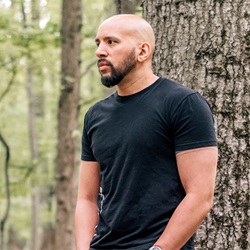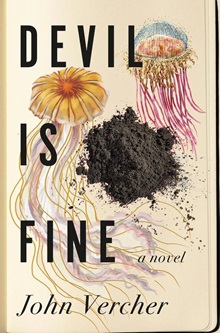Meet Drexel Writing Festival Author John Vercher, Author of Forthcoming Novel "Devil is Fine"
By sarah hojsak
April 18, 2024

A desire for more creative fulfillment in his career set John Vercher on the path to becoming an acclaimed novelist. While he always loved to write, he originally pursued what he thought was a more practical career. But his need to tell stories never disappeared. Now, he’s getting ready for the release of his third novel, "Devil is Fine," which comes out June 18 from Celadon Books and is available for pre-order now. Vercher also recently joined Drexel as an Assistant Teaching Professor of English, where he teaches first-year writing as well as graduate courses in the Creative Writing MFA program.
Like his previous two novels, "Three-Fifths" and "After the Lights Go Out," "Devil is Fine" centers a mixed-race Black protagonist and explores themes of family and identity. "I'm always interested in in exploring family dynamics and interrogating the mixed-race experience," Vercher explained. "I'm not coming to those themes with any answers — I’m asking questions about what it means to come from that background and how to discover who you are within that history. It's a constant exploration."
John Vercher will read from "Devil is Fine" at the Drexel Writing Festival on Tuesday, May 7 at 3 p.m. Read the full Q&A below to learn more about his inspiration, creative process and advice for aspiring writers.
 What was your path to becoming a published novelist?
What was your path to becoming a published novelist?
I earned my undergraduate degree in English at the University of Pittsburgh, but I didn’t really see a path forward with that. Both my parents were in healthcare, so as an undergraduate, I had started on a physical therapy track because that was what I thought I was going to do. I was still able to get a bachelors in whatever I wanted, and I still loved writing, so I graduated with an English degree, got into PT school and ended up being a clinician for more than 10 years. But I never felt the kind of career satisfaction that I'd hoped for and never got to scratch that creative itch.
As I spent more and more years working in that profession, I became increasingly unhappy. My wife was (and is) a terrific supporter, and said, "You have to do something else." So I started looking into MFA programs, because by that point I'd forgotten everything I'd learned about craft and structure. I found a low-residency program similar to the setup that we have at Drexel, where I could go for a week-long residency twice a year and then work with mentors over the rest of the year. My thesis ended up becoming my first novel, "Three-Fifths." After the publication of that, I started finding writing work, either as a copywriter or ghost writer, until things were sustainable enough that I could really focus on my own writing as a career.
Did your MFA program help you figure out how to navigate the publishing industry?
No, and that's one of the reasons I’m really adamant about being transparent about the process with anybody that asks. A lot of MFA programs don't focus on that — there seems to be this unwillingness to talk about art and commerce, when unfortunately, the two often cross paths. I think that's one of the things that's so great about the Drexel MFA is that education about the publishing industry and process is built into the program here. I had to do a lot of trial and error on my own.
What was that experience like?
Frustrating, but in retrospect, I'm glad it happened that way. I feel like I understand it better than I would have if I had had someone walk me through it. I got my first book deal through a small independent publisher that didn't require an agent, then I got an agent because I didn't understand contract language. It's not an easy road if you don't have some guideposts, and sometimes it feels like that's intentional, especially for writers from systematically disenfranchised communities. It feels like there's some gatekeeping going on [in the publishing industry], but I'm glad I learned what I learned.
Tell me more about your new novel, "Devil is Fine."
"Devil is Fine" is about a mixed-race Black man who inherits a plantation from the white side of his family and becomes literally and figuratively haunted by the history behind that land. He's navigating this new reality while also dealing with the loss of his teenage son, and all of that connects to ideas about fatherhood, religion and family. There's some magical realism mixed with a little bit of historical fiction and satire.
Where did the inspiration for this story come from?
This came from discovering that there was, or is, a plantation in the mid-Atlantic region. That's where this story takes place — a fictionalized version of that beach town. Even today, there is still this narrative that plantations were unique to the deep South and that’s very much not the case.
What kind of background research did you do to create a fictional narrative based on this real place?
I was fortunate enough to speak with one of the DNA researchers that was involved in the excavation of that plantation, as they discovered bodies of both enslaved and enslavers on that property. I still follow news about the site as researchers have been publishing new papers about what they found.
Why did you decide to use writing techniques like magical realism?
I'm always trying to do something different than the last book I wrote, despite my recurrent themes. This was probably the most fun I've ever had writing, even while dealing with heavy topics. Magical realism allowed me to be as unlimited in my creativity as I've ever been.
As a Drexel faculty member, what do you like best about working with students?
I love seeing people come to a first-year writing class dreading it and leaving with a more positive perspective about writing. It doesn't happen to everybody, and I get it. Writing is not the easiest thing to do, and it can leave you feeling vulnerable when you're putting your thoughts and feelings on the page. One of the most rewarding parts of teaching writing is seeing students realize it's not so bad when they get to shed some of the "rules" they were given in high school composition.
What advice would you give students who hope to publish their own work?
Don't be afraid to ask questions. Many writers that would love to share information [with students]. And don't quit. Publishing is a challenging endeavor in the sense that it takes a lot of rejection. You'll get way more rejection notices than you will acceptance notices. But don’t let that dissuade you, because the cliché holds true that it only takes one "yes" to get the journey started.